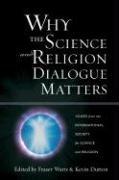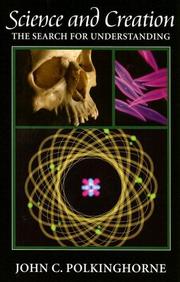| Listing 1 - 10 of 341 | << page >> |
Sort by
|

ISBN: 1283321211 9786613321213 1599472449 9781599472447 9781599471037 1599471035 Year: 2006 Publisher: Philadelphia : Templeton Foundation Press,
Abstract | Keywords | Export | Availability | Bookmark
 Loading...
Loading...Choose an application
- Reference Manager
- EndNote
- RefWorks (Direct export to RefWorks)
Periodical
Year: 1989 Publisher: Exeter : Exeter : Paternoster Press Science Christian Belief
Abstract | Keywords | Export | Availability | Bookmark
 Loading...
Loading...Choose an application
- Reference Manager
- EndNote
- RefWorks (Direct export to RefWorks)
Book
ISBN: 1443883034 9781443883030 1443876577 9781443876575 Year: 2015 Publisher: Cambridge Scholars Publishing
Abstract | Keywords | Export | Availability | Bookmark
 Loading...
Loading...Choose an application
- Reference Manager
- EndNote
- RefWorks (Direct export to RefWorks)
Up until the time of Newton, scientists regarded the understandings of the physical world, at which they were arriving, as glimpses of the working of the Creator's mind. Thus, the generalisations being formulated about the behaviour of matter - the "Laws of Nature" - were seen as the Creator's injunctions, to created matter, as to how it was to act. They were "laws" in the same sense as laws, Divine or human, about how people should behave: that is why the same word was used for both. And even now, scientific laws are occasionally spoken of as being "obeyed"!However, it is doubtful whether any
Book
ISBN: 142143847X 9781421438474 9781421438467 1421438461 Year: 2020 Publisher: Baltimore, Maryland
Abstract | Keywords | Export | Availability | Bookmark
 Loading...
Loading...Choose an application
- Reference Manager
- EndNote
- RefWorks (Direct export to RefWorks)
Physico-theology is a term for the innovative currents of thought in England and Europe that emphasized the religious value of the new sciences and philosophies after 1650. This term is central to the relations between science and religion during the intellectual transition from early modern to modern. This edited volume is the first publication in which experts from multiple national perspectives address the interactions of physico-theology and natural theology in England and on the Continent.
Book
ISBN: 1779952074 Year: 2022 Publisher: Cape Town, South Africa : AOSIS,
Abstract | Keywords | Export | Availability | Bookmark
 Loading...
Loading...Choose an application
- Reference Manager
- EndNote
- RefWorks (Direct export to RefWorks)
Science and Faith in Dialogue presents a cogent, compelling case for concordance between science and theism. The term theism refers, in this book, to the belief in God's existence. Within theology, the term theism is often used to convey a range of presuppositions about the nature and attributes of God. Based on scientific and natural theological perspectives, two pillars of natural theology are revisited: the Cosmological Argument and the Argument from Design. The book argues that modern science provides undeniable evidence and a scientific basis for these classical arguments to infer a rationally justifiable endorsement of theism as being concordant with reason and science - nature is seen as operating orderly on comprehensible, rational, consistent laws, in line with the conviction that God is Creator.
Book
ISBN: 2763736165 9782763736167 Year: 2018 Publisher: Qubec : Presses de l'Université Laval,
Abstract | Keywords | Export | Availability | Bookmark
 Loading...
Loading...Choose an application
- Reference Manager
- EndNote
- RefWorks (Direct export to RefWorks)
La littérature scientifique regorge d’informations sur le phénomène religieux qui, malheureusement, atteignent rarement le grand public. L’auteur a parcouru des centaines de ces travaux et nous livre, dans cet ouvrage de vulgarisation, des résultats qui étonneront tant les spécialistes de diverses disciplines que tous ceux et celles qui se questionnent sur le phénomène religieux. Les données recueillies révèlent des aspects fort méconnus de la religion et défont plusieurs idées reçues. Est-il vrai, par exemple, que la religion est un gage de meilleure santé ? La croyance religieuse est-elle en régression ou connaît-elle une remontée ? Religion et morale vont-elles de pair ? La religion est-elle un facteur de violence ou de pacification ? Que révèlent les recherches scientifiques sur les expériences de mort imminente (near death experience) et les « sorties hors corps » ? Comment la théorie de l’évolution explique-t-elle l’origine et la persistance de la religion ? Ce sont là quelques-unes des questions abordées dans cet ouvrage qui jette un regard critique sur le phénomène religieux en prenant résolument parti pour la science. Que vous soyez croyant ou incroyant, vous ne verrez plus la religion de la même manière après avoir lu ce livre.
Book
ISBN: 1280657529 9786613634450 0761858067 Year: 2012 Publisher: Lanham, Md. : University Press of America,
Abstract | Keywords | Export | Availability | Bookmark
 Loading...
Loading...Choose an application
- Reference Manager
- EndNote
- RefWorks (Direct export to RefWorks)
Grizzle provides a history of science/religion interactions, with an emphasis on Christianity. He also examines his own history of dialogue, which involves self-reflection and interactions with others on science and religion. He focuses on what we have learned about the structure, history, and functioning of creation.

ISBN: 1283260352 9786613260352 1599472163 9781599472164 9781599471006 1599471000 Year: 2006 Publisher: Philadelphia Templeton Foundation Press
Abstract | Keywords | Export | Availability | Bookmark
 Loading...
Loading...Choose an application
- Reference Manager
- EndNote
- RefWorks (Direct export to RefWorks)
John C. Polkinghorne, internationally renowned priest-scientist, addresses fundamental questions about how scientific and theological worldviews relate to each other in this, the second volume (originally published in 1988) of his trilogy, which also included Science and Providence and One World.Dr. Polkinghorne illustrates how a scientifically minded person approaches the task of theological inquiry, postulating that there exists a close analogy between theory and experiment in science and belief and understanding in theology. He offers a fresh perspective on s
Book
Year: 2022 Publisher: Cape Town, South Africa : AOSIS,
Abstract | Keywords | Export | Availability | Bookmark
 Loading...
Loading...Choose an application
- Reference Manager
- EndNote
- RefWorks (Direct export to RefWorks)
Science and Faith in Dialogue presents a cogent, compelling case for concordance between science and theism. The term theism refers, in this book, to the belief in God's existence. Within theology, the term theism is often used to convey a range of presuppositions about the nature and attributes of God. Based on scientific and natural theological perspectives, two pillars of natural theology are revisited: the Cosmological Argument and the Argument from Design. The book argues that modern science provides undeniable evidence and a scientific basis for these classical arguments to infer a rationally justifiable endorsement of theism as being concordant with reason and science - nature is seen as operating orderly on comprehensible, rational, consistent laws, in line with the conviction that God is Creator.
Periodical
Year: 1987 Publisher: Ipswich, Mass. : American Scientific Affiliation,
Abstract | Keywords | Export | Availability | Bookmark
 Loading...
Loading...Choose an application
- Reference Manager
- EndNote
- RefWorks (Direct export to RefWorks)
| Listing 1 - 10 of 341 | << page >> |
Sort by
|

 Search
Search Feedback
Feedback About UniCat
About UniCat  Help
Help News
News